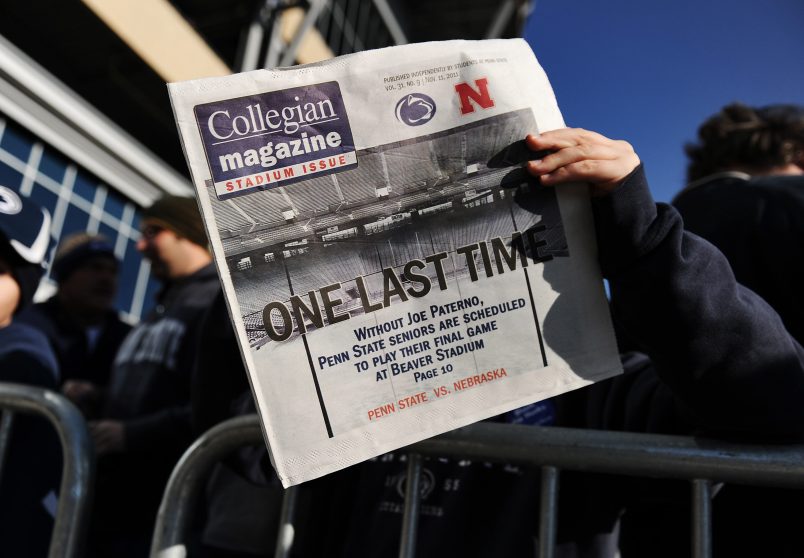College journalists with a passion for giving a voice to the voiceless are speaking up for themselves in a campaign combating some of the same forces that have battered newspapers across the country as digital media has imperiled print.
For years, while ad revenue has plummeted, college editors have suffered in relative silence. Some have taken to crowdsourcing for money while others have relied on alumni donations to help keep their independent papers afloat. But for many, the task has proved too great, and students have been forced to downsize operations.
Over the last few weeks, a Save Student Newsrooms movement has emerged from the college journalists who are being most affected.
Through social media campaigns, awareness events and editorials, more than 100 newsrooms across the U.S. used their platforms Wednesday to show why it’s important they remain viable and independent.
“I want more people to think about how integral college publications and local publications are to keeping everything in check and being a watchdog as a whole,” said Jemima McEvoy, editor-in-chief of Washington Square News at New York University. “Because if they were gone, I think people would definitely notice.”
A growing number of independent newsrooms have needed to consider whether to re-affiliate with their universities or shutter offices. To editors across the country, the looming possibility of administrative oversight represents an impingement on their freedom — and a potential censorship threat.
One editorial, which appeared in print Wednesday, chronicled the efforts of student journalists who put hours into what they love and warned against university encroachment.
“To place a student run organization in the hands of the school is to take the voice of the student body away,” wrote the editorial board at the University of New Haven’s Charger Bulletin.
The Save Students Newsroom initiative got its start after a University of Florida-Gainesville reporter saw on Twitter that a Texas school’s paper was in crisis.
Melissa Gomez, editor-in-chief of the Independent Florida Alligator, saw that the board of Southern Methodist University’s The Daily Campus had decided the independent paper would re-affiliate with SMU and continue only online. Frustrated by the news, Gomez and her managing editors at the Alligator decided to act.
When the College Media Association surveyed its members last year, it found around 30 percent of respondents had reduced the number of papers they printed to deal with declines in funding. Almost 20 percent reported their ad revenue had dropped between 10 percent and 20 percent, with others experiencing an even larger dip.
At NYU, McEvoy has been forced to cut the newspaper by four pages and slice circulation. Meanwhile, Gomez has trimmed the Alligator’s print publication, now down to three times a week. And as Glenn Rohrbacker and staff try to make the University of New Haven’s Charger Bulletin independent, they have already shifted print from weekly to biweekly, with more cuts to come.
“Print may be in our future, but it is not our future,” Rohrbacker said.
For student journalists, the losses their newsrooms are suffering have widespread repercussions. For one, college newspapers are a training ground for future reporters and editors. But students also argued they are filling a need in communities where local papers are now short-staffed or out of business.
“We have the responsibility to make up that hole,” said McEvoy. “But then we’re getting more work and less compensation because the same trend affects us.”
In the last year, student newsrooms have often found themselves at the epicenter of breaking national stories. The State News at Michigan State covered sexual misconduct allegations surrounding gymnastics coach Larry Nassar. At Syracuse University, journalists from the Daily Orange have been breaking stories about a campus fraternity accused of racism.
College newspapers also work to hold their fellow students financially accountable. Gomez said that at the Alligator, her team helps to ensure that the student government puts its $20 million budget to good use.
Amid discussions about threats to journalism, college papers rarely factor, Gomez said.
“A lot of the time, there’s not a lot of advocacy for student journalists,” she said. “We want to make sure we’re part of the conversation, too.”







This is more important than many people acknowledge.
Sure, some student newspaper content is self-indulgent, or excessively ideological, or immature, or just whiny. Guess what: So is some news content written and published by established “adults”.
But at a time when independent journalism is under assault from the President and his allies, and corporate shorttermism and popular Iwantitfreeism are shrinking or closing newsrooms, college newspapers are a crucial medium for open expression of independent researching, reporting, and analysis of issues that matter to local communities. They tend to be unfettered by the ruts that other publications find themselves retreading because “that’s the way we’ve always done it” or “people tried that in the Eighties and didn’t succeed.”
Often, the same edition that carries someone’s insistence on banning speakers who are contrary to her well-intentioned ideal also prints calls for open exchange of diverse ideas in free debate. But factional warriors only notice whichever part offends their side and reinforces their stereotypes.